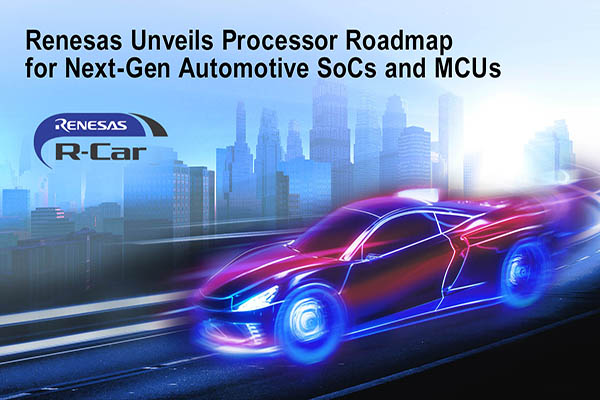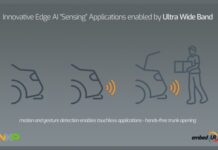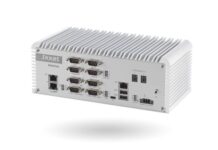Renesas Electronics Corporation laid out plans for its next-generation system on chips (SoCs) and microcontrollers (MCUs) targeting all major applications across the automotive digital domain.
Renesas provided advance information about its fifth-generation R-Car SoC for high-performance applications with advanced in-package chiplet integration technology, which will provide automotive engineers greater flexibility to customize their designs. For example, if more AI performance is required in Advanced Driver Assistance Systems (ADAS), engineers will have the capability to integrate AI accelerators into a single chip.
The company also shared its plans for two forthcoming MCU product advancements in the next-generation R-Car family. One is a new crossover MCU series designed to deliver the high performance required for domain and zone electronic control units (ECU) in next-generation E/E architectures in automobiles. These MCUs are expected to close the performance gap between traditional MCUs and the advanced R-Car SoCs. Secondly, the company announced plans to introduce a separate MCU platform tailored for the vehicle control market. Both of these MCUs will be powered by Arm architectures and are set to become an integral part of the industry-leading R-Car family, offering complete scalable options and software reusability for automotive engineers.
As part of its roadmap, Renesas plans to offer a virtual software development environment that aligns with the auto industry’s move toward shift left approach, as this practice is widely known. These software tools will allow customers to design and test software earlier in the development process.
“This roadmap comes after years of collaboration and discussions with Tier 1 and OEM customers,” said Vivek Bhan, Senior Vice President, Co-General Manager of High Performance Computing, Analog and Power Solutions Group at Renesas. “What our customers have been telling us is that they need to be able to accelerate development without compromising quality. This means they must design and verify their software even before hardware arrives. We will help them realize this goal by continuing to invest in shift left and software-first innovations, deploying new scalable embedded processors, and bolstering our vast network of development tools.”
Fifth-Generation R-Car SoC Platform
Until the fourth generation, the R-Car SoCs were designed for specific use cases, such as ADAS/Autonomous Driving that requires high AI performance, and gateway solutions with enhanced communication capabilities. Renesas’ fifth-generation R-Car SoC will incorporate chiplet technology to create a flexible platform that can be customized to meet various requirements for each use case. The new platform will offer multiple processor sets from entry-level to higher-end models, and can integrate a variety of IP such as AI accelerators and IP by partners and customers into a single package. This will give users the option to customize designs according to their needs.
Two New Arm-based MCU Platforms for Vehicle Control Applications
As E/E architecture in vehicles continues to evolve, it becomes increasingly important for domain control units (DCUs) and zone control units to handle both high computing performance and real-time processing. Renesas addresses this challenge by developing an Arm-based 32-bit crossover R-Car MCU platform with built-in NVM (Non Volatile Memory) that can deliver higher performance than traditional MCUs currently offer. Moreover, to build upon the success achieved by the RH850 Family MCUs, Renesas is also extending its vehicle control portfolio with a new R-Car MCU series, which will be also powered by Arm. This means for the first time, automotive system developers will be able to take advantage of the software and vast eco-system of Arm by using these new MCUs to build powertrain, body control, chassis and instrument cluster systems. This expansion will allow Renesas to standardize IP between MCUs and SoCs, thus increasing software usability and preserving engineering investments for its customers.
Renesas plans to release new products subsequently from 2024 onward, following this roadmap.
Software Development Environment
As automotive software grows in size and complexity, the conventional approach of using hardware for software design is becoming outdated due to its lengthy production process.
Renesas is already pioneering a virtual development environment for application software, offering advanced debugging and evaluation tools to analyze and evaluate software performance. Renesas will provide these tools for next generation processors from 1Q 2024. This allows developers to accelerate their software development efforts even before prototypes of the next-generation devices are accessible, enabling them to bring their products to market more rapidly.
















